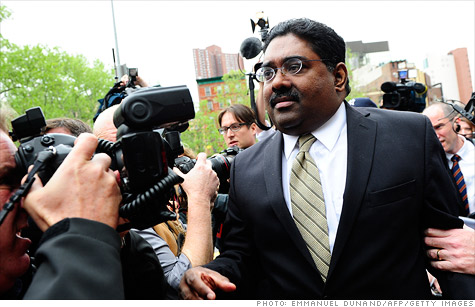
The insider trading probe netted former hedge fund founder Raj Rajaratnam who was found guilty in the biggest Wall Street trial in years.
NEW YORK (CNNMoney) -- In the nearly two years since the government began cracking down on insider trading, federal prosecutors have charged and convicted dozens of people in several overlapping cases.
The sweeping probe has resulted in criminal charges against 49 individuals and has yielded 40 convictions since August 2009, according to the U.S. Attorney's Office in Manhattan.
The Securities and Exchange Commission has also stepped up its enforcement actions, filing civil charges against more than 138 individuals in over 50 cases in the past 18 months.
"The sheer number of people that have been charged and convicted in all these cases is stunning," said Jonathan New, a former federal prosecutor in the Southern District of New York, who is now at Baker Hostetler.
The multiple civil and criminal investigations have mainly targeted hedge fund traders and corporate insiders who leaked information in exchange for cash. But the authorities have also charged several employees of a California-based expert networking firm, which helped connect funds with company insiders for a fee.
In addition to its size and scope, the investigation has been remarkable for its use of wire taps and cooperating witnesses.
These tactics, normally used to fight organized crime and drug cartels, have helped prosecutors connect individual defendants to a broad network of insider trading, said John Coffee, a professor of securities law at Columbia University.
"While it's sprawling, it's also connected," he said.
The biggest win for the government so far was the conviction of Raj Rajaratnam, the founder of the now defunct hedge fund Galleon Group, who was found guilty last month on 14 counts of securities fraud and conspiracy.
The closely watched case featured recordings of phone conversations in which Rajaratnam and his sources blatantly discuss ways to profit from non-public information.
But there is growing speculation that federal investigators have set their sights on another big hedge fund, SAC Capital, although no charges have been announced.
The Wall Street Journal reported last week that SAC is the subject of an investigation by the Securities and Exchange Commission into suspicious trades related to a 2007 merger in the health-care industry.
SAC and its manager, Steven A. Cohen, have not been accused of any wrongdoing. The Connecticut-based hedge fund, which manages over $16 billion, has said that it is cooperating with the investigation.
"The SEC has always had a hit list of high profile targets, and SAC is about as high profile as you get," said Elliott Lutzker, a former attorney with the Division of Enforcement at the SEC, who is now a partner at Manhattan-based Davidoff, Malito & Hutcher LLP.
However, Lutzker said it would be a difficult case to make because SAC is known to have very strict compliance procedures and the firm's top brass are well insulated.
"It's virtually impossible to prove that Steve Cohen or any of the top ranks of management violated any laws," he said, adding that the SEC or FINRA, an industry watchdog, may be able to fine the firm for poor management practices.
But that does not mean that the authorities won't go after individual SAC traders, he added.
Noah Freeman, a former SAC trader who has pleaded guilty to insider trading, reportedly testified this week that he was involved in six transactions that involved inside information from an expert network consultant while working at SAC.
There is no indication that SAC is being investigated for those trades and the firm has said Freeman's actions violated its policies, said Jonathan New, the former federal prosecutor.
New stressed that it's too soon to speculate about any civil or criminal case against SAC, but he did not rule out the possibility that charges could be announced at some point.
"There's nothing about SAC that makes it a particularly ripe target, it's just where facts appear to be leading," he said. ![]()